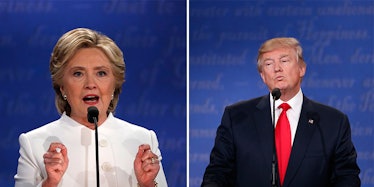
Everything The 'Facebook Politicians' Forgot To Tell You About The Election
Over the summer, I was talking to someone about the presidential election when they looked at me and said, "I'm sorry this is the first election you're voting in. I promise they're not usually like this."
At the time, the apology seemed misplaced. Sure, it was absurd to me that Donald Trump was the Republican nominee, but it did not seem all that bad otherwise.
Fast-forward a few months and three debates later, and I get it. At this point, the election seems more about spectacle than politics. I've heard more conversations about emails and grabbing women by their genitals than I've heard about policy.
The election has become so sensationalized and full of divisiveness that it has left many people feeling completely disheartened by the entire process.
If you are anything like me, you try to stay informed on the election by reading and watching the news. But, you also get the majority of your information from what people share on Facebook.
From what I have seen on my own Facebook News Feed, some people are so fed up with Donald Trump and Hillary Clinton that they don't plan on voting at all.
There a lot of reasons I think skipping the polls on November 8 is a bad idea, and there are plenty of other articles and "Facebook politicians" — aka the people who talk about the election all the time on Facebook but couldn't hold their own in an actual debate — who can explain why.
But I'm going to discuss one specific reason that has not received much attention throughout this campaign season:
When you go to the polls on November 8, you're not just voting for the president, but for Congress as well.
Here are four reasons that's so important to understand:
1. A little thing called checks and balances.
You may remember learning about checks and balances in a US history class you were forced to take in high school. If you don't remember, here is a little refresher for you:
Our system of checks and balances (legislative, executive and judicial) exists in the US in order to make sure no one person or group has too much power.
For example, if Donald Trump is elected president, that does not necessarily mean his plan for a wall paid for by Mexico will actually happen. So, even if you're not happy with who becomes president, you still have the ability to influence what happens within the government.
Who you vote for to represent you in Congress can potentially have a bigger impact than the president.
Who you vote for to represent you in Congress can potentially have a bigger impact than the president.
2. It's a way to get your voice heard.
The president's job is to represent the entire country. That's roughly 318 million people. Members of the House of Representatives, on the other hand, represent roughly 700,000 people. While this is still a large number, it is substantially smaller than the president.
The chances of your opinions being listened to by your congressman/woman are much higher than them being heard by the president.
Since Congress is responsible for less people than the president, who you check on the ballot for the Senate or House is much more likely to listen to you and fight for the causes you believe in.
3. You may have an easier time finding someone you want to support.
Throughout the entire campaign season, I hadn't found someone I really agreed with or supported. I was starting to get frustrated with the election, but then I found information on one of the people running for Congress in my district.
This nominee stood for exactly what I believe in. I signed up to volunteer with his campaign and was immediately filled with hope. My main thought throughout the entire experience was, "Maybe the election won't be so bad after all."
4. We can be the generation that takes control of our government.
It's easy to feel like you don't really have any impact on what happens within our government, but we have more of a say than it may feel sometimes.
If every Millennial went out to vote for someone who will truly represent them in Congress, we could completely change the makeup of who is filling the seats in the House and Senate.
Millennials could completely change the makeup of who is filling the seats in the House and Senate.
If we want a government that represents us and our beliefs, then we can't just sit at our computers and complain (looking at you, Facebook politicians). We need to go out and take charge.
Even if it seems too late to really change the presidential election, we can still control who represents us in Congress.
I'll be voting on November 8 in order for my voice to be heard. Will you?